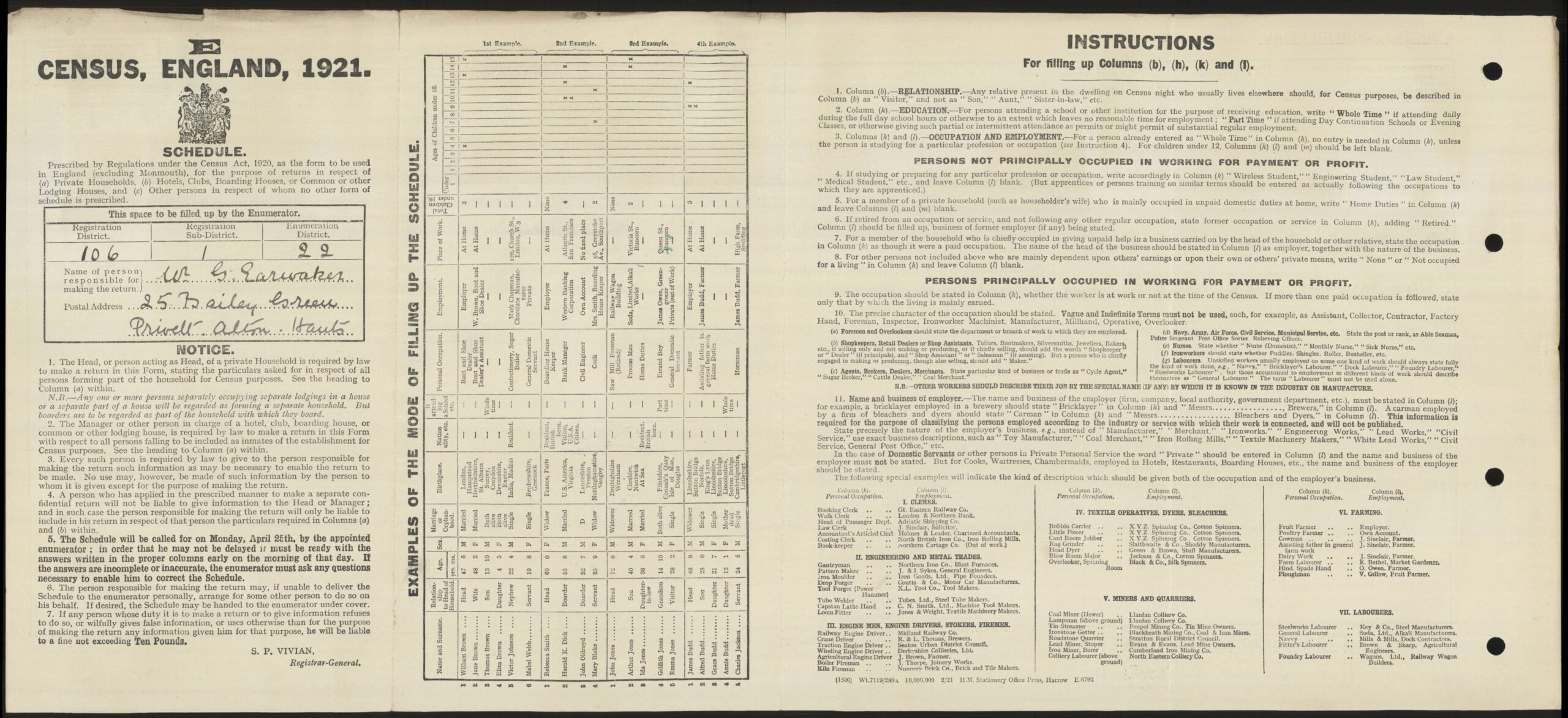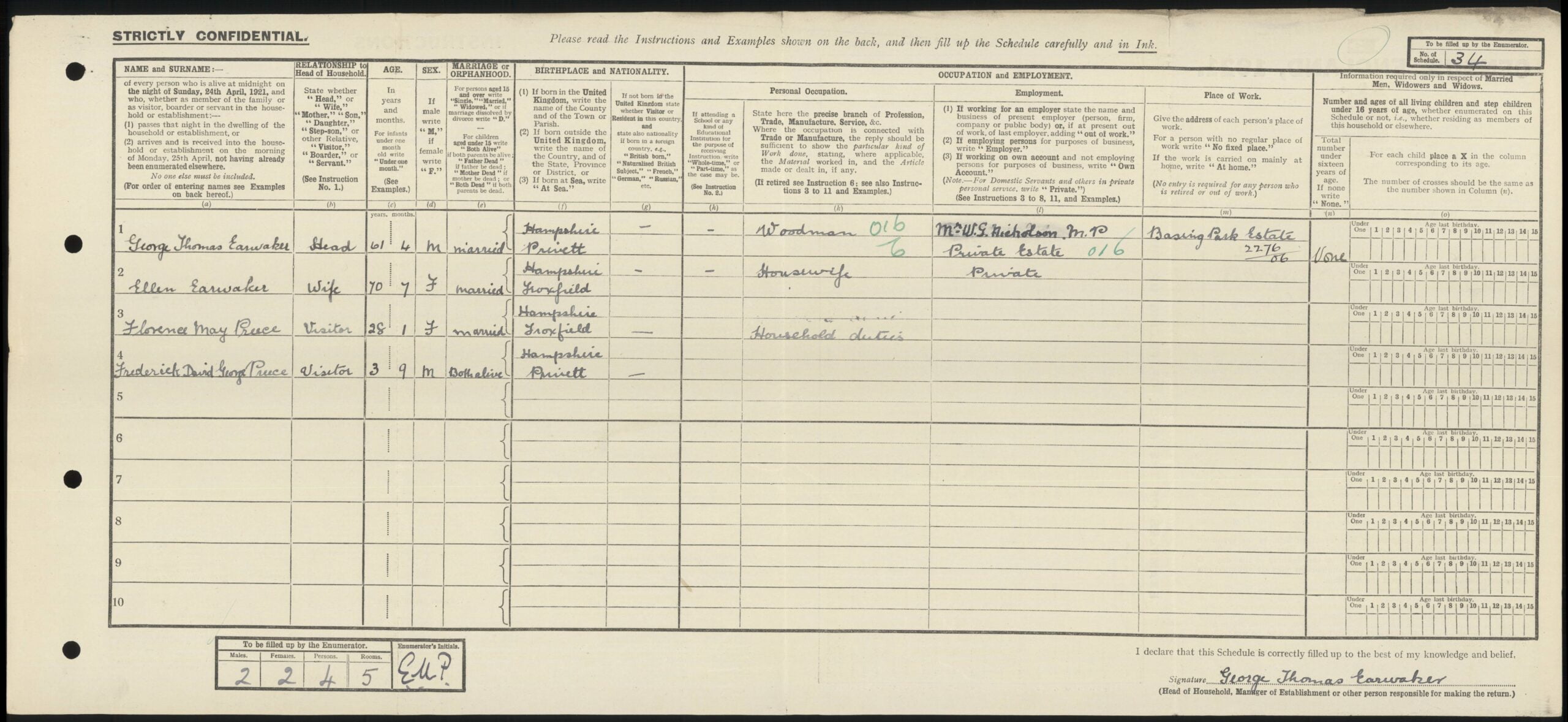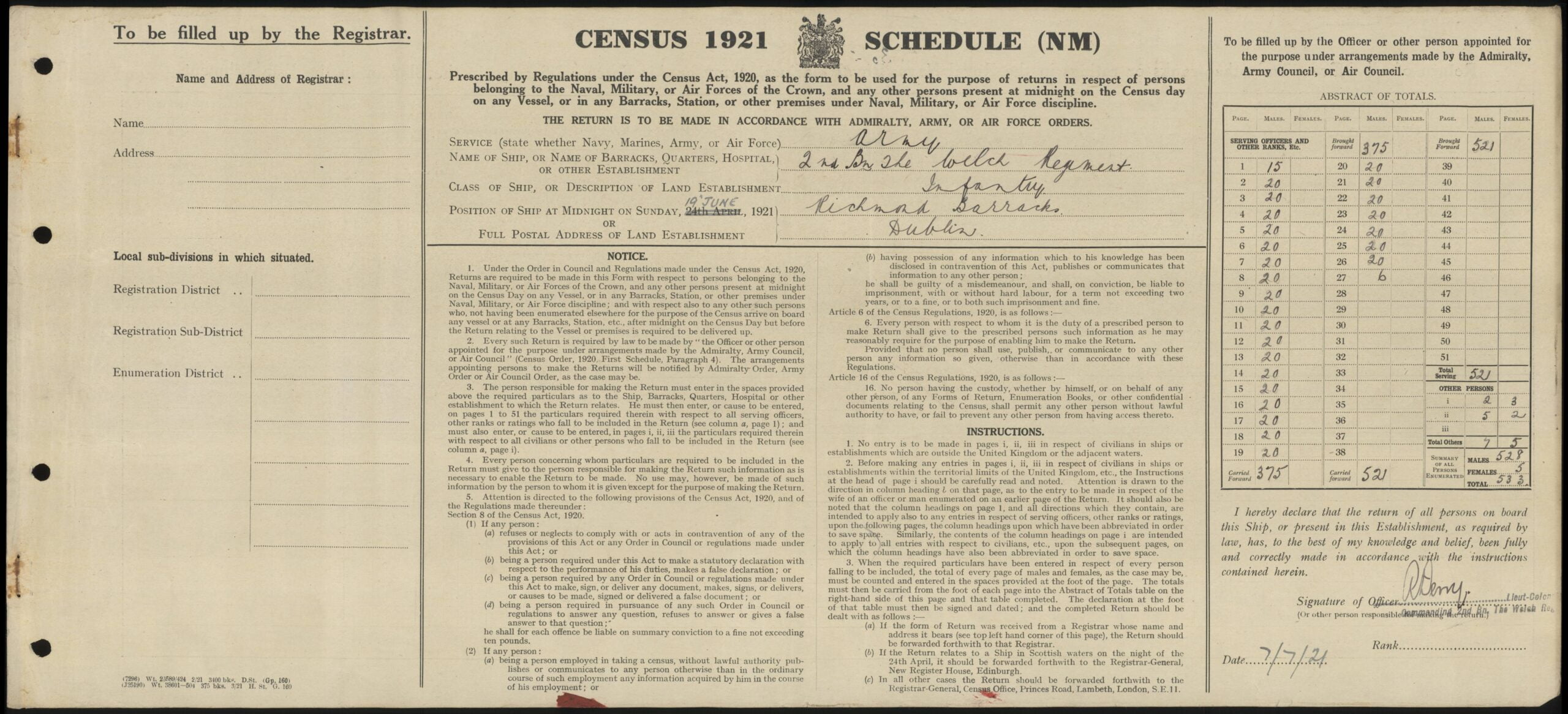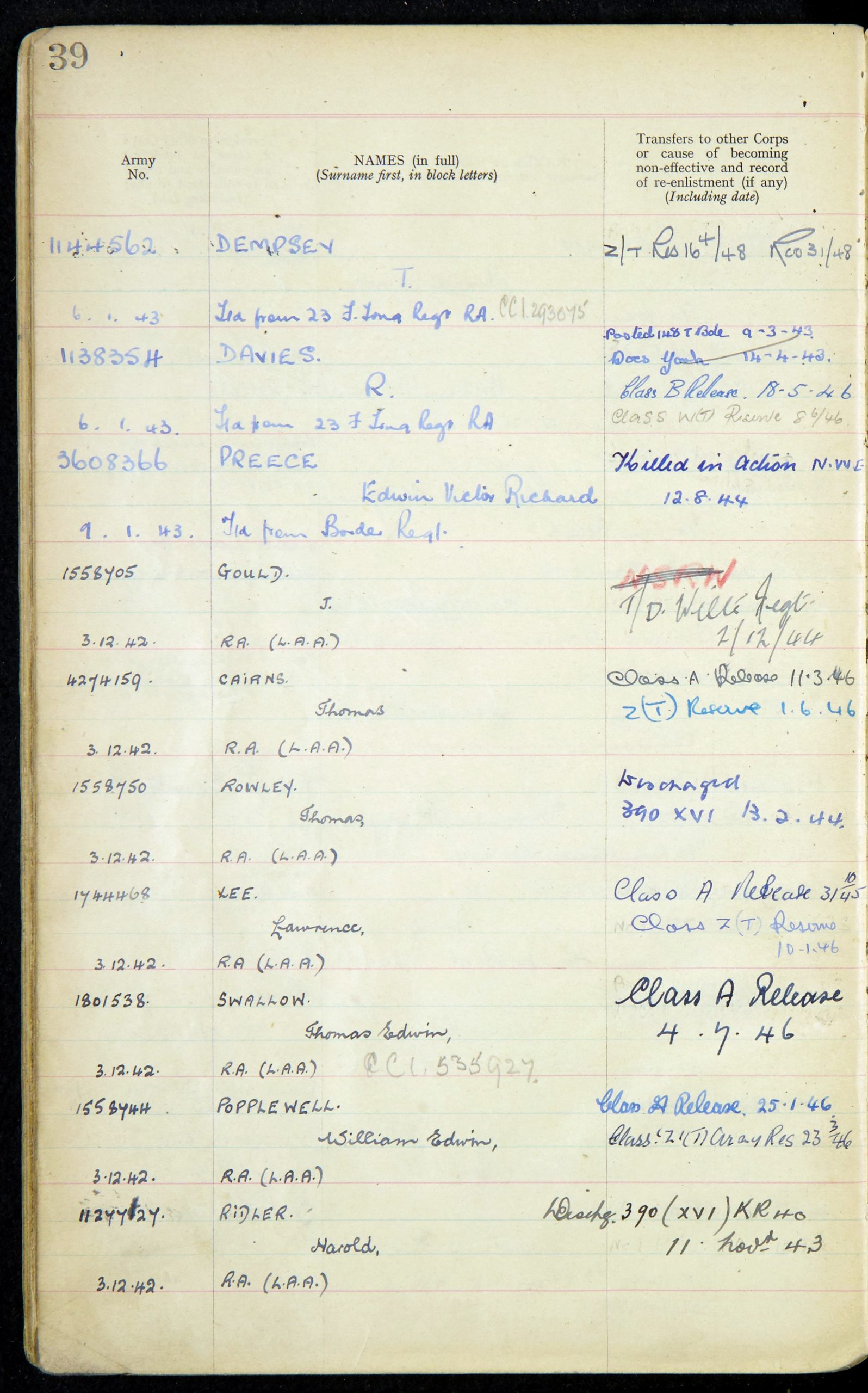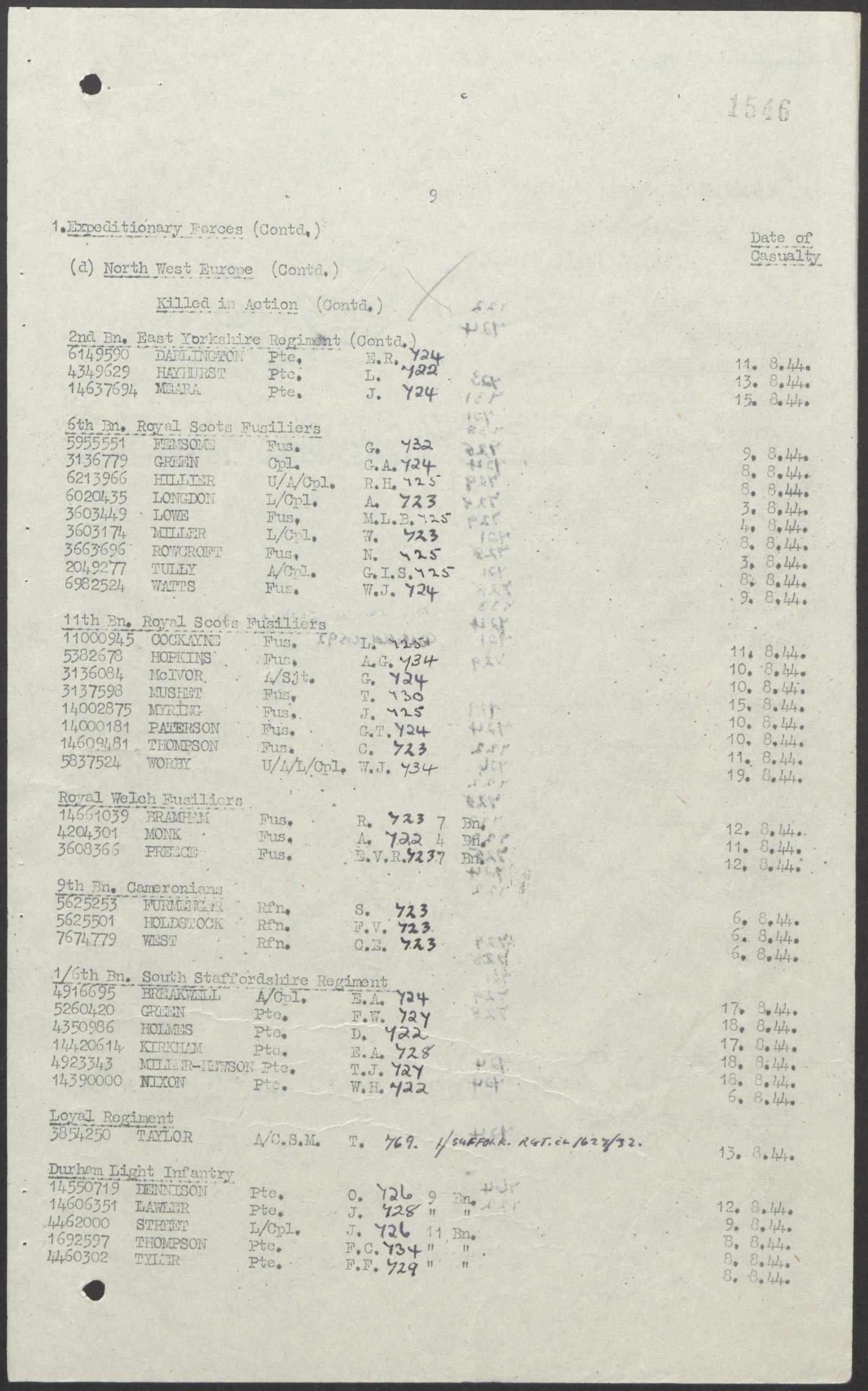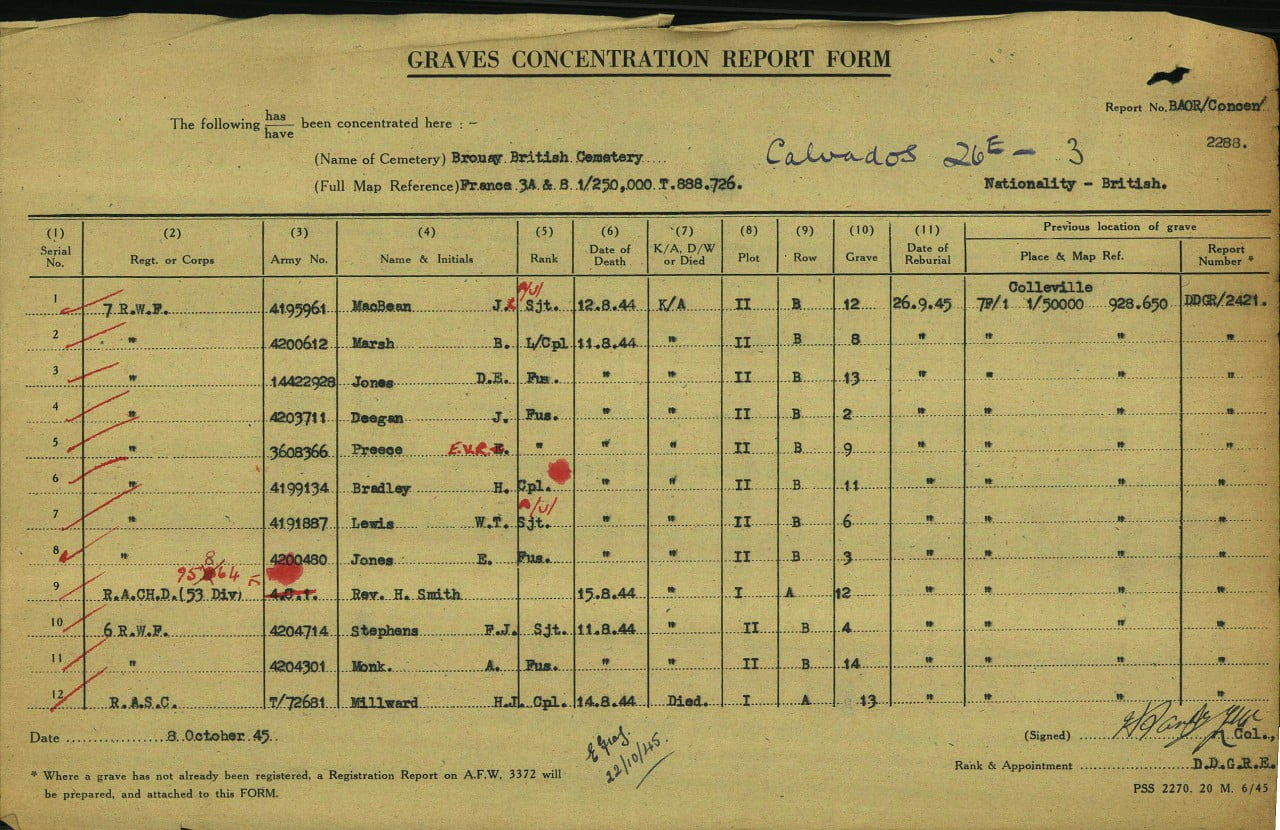Edwin Victor Richard Preece was born in the September quarter of 1923, (Petersfield Vol. 2c Page 296), a twin to his sister Mary C.E. Preece. They were the children of David & Florence May Preece (nee Earwaker) who married in the September quarter of 19116 (Petersfield Vol. 2cPage 367) (The district Petersfield spans the boundaries of the counties of Hampshire and Sussex.)
An elder brother, Frederick D.G. Preece had been born in the December quarter of 1917 (Petersfield Vol. 2c Page 247).
According to the CHESTER FAMILY TREE (ClChester40)
https://www.ancestry.com/family-tree/person/tree/5534722/person/24011645760/story They just had the 3 children.
The 1921 census, which was taken on the 19th of June 1921, sees David Preece in the 2nd Bn. The Welch Regiment, living at Richmond Barracks, Dublin, he was 30 years and 9 months old, born in Welshpool, Montgomeryshire and a Sergeant, Regimental No. 3948032. His wife, Florence May Preece was visiting her parents, Ellen Earwaker and her husband George Thomas Earwaker at 25, Bailey Green, Privett, Alton, Hants. Florence May was 28 years and 1 month old and had been born in Froxfield, Hampshire. Her son Frederick Davd George Preece was 3 years and 9 months old and had been born in Privett, Hampshire.
I do not know when they came up to the North West and in particular the Welsh Land Settlement at Sealand, please click on the website https://wlssealand.wordpress.com/about/ which is excellent for giving you the origins and lots of photographs and nostalgia about the Settlement.
So the next time we see the family is on the 1939 National Register which was taken on the 29th September 1939. They were then living at 1, West Green, Welsh Land Settlement, Hawarden, Flintshire, next door to the Manor Farm House, Welsh Land Settlement Office and Buildings.
This source gives us the date of birth of Edwin’s father David Preece, as the 12th September 1889 and he was a Market Gardener Tractor Driver (Air Raid Warden), Florence < Preece was born on the 27th May 1893 and as most women without a job in these times was described as doing “Unpaid Domestic Duties.” Their eldest son Frederick D. G. Preece’s birth date was the 1st September 1917, single and a GPO Sorting Clerk & Postal Telegraphist, Edwin V. R. Preece, born on the 9th September 1923, was single and a Horticultural Worker. There are2 redacted or closed records, one on which may have been Edwin’s twin sister Mary, but really shouldn’t be as she was the same age as Edwin, 16 years old. Perhaps Mary wasn’t in the household that day and they may have been more siblings, so any information would be appreciated. Please get in touch with the website if you have anything you can add.
I do not know when Edwin enlisted or was conscripted, but according to the Transfer in Register of the Royal Welsh Fusiliers, he was transferred in on the 9th of January 1943 from the Border Regiment and then it is recorded that he was killed on the 12th of August 1944, roughly a month before his 21st birthday.
The Casualty List (1546) (Page 9) tells us that he was Killed in Action on the 12th of August, along with his soldiers in arms 14661039 Fus. Raymond Bramham who was also in the 7th Btn. (age 19 years, from Rotherham) and died on the 12th, the same day as Edwin, he rests in Grave 1 E 6. Also 4204301 Fus. Alexander Monk (from Preston, age 28 years) of the 4th Btn., he died on the 11th.
I thought that he would have been involved in the Battle of Normandy and may have been injured, and died later, but his cause of death was Killed in Action. Please see:- https://www.dday-overlord.com/en/battle-of-normandy/after-action-reports/53rd-infantry/7th-bn-royal-welsh-fusiliers-july-1944 – 7th Battalion Royal Welch Fusiliers – July 1944 – 53rd Infantry Division – Battle of Normandy – After Action Reports
Also https://en.wikipedia.org/wiki/53rd_(Welsh)_Infantry_Division
1944–1945
After several years of training, the 53rd (Welsh) Division landed in Normandy on 28 June 1944 (although a small detachment from no.2 Platoon arrived on 12th june including Norman Branch), the second last British infantry division to land and was placed under command of XII Corps, defending the Odon Valley position.[18] The division was involved in much fighting in this area, with the 158th Brigade detached to fight with the 15th (Scottish) Infantry Division in the Second Battle of the Odon (Operation Greenline) before Operation Goodwood in mid-July. In August it began to push beyond the Odon and crossed the river Orne, helping to close the Falaise Pocket. It was during this fighting that Acting Captain Tasker Watkins, Officer Commanding (OC) B Company of the 1/5th Battalion, Welch Regiment was awarded the Victoria Cross, the first and only to be awarded to the regiment and division during the war, as well as the only Welshman of the British Army during the Second World War to be awarded the VC.[19]
On 2 August, the GOC, Major-General Ross, decided that due to the casualties suffered by the division in Normandy and an acute lack of infantry replacements, the battalions of 158th Brigade (the 4th, 6th and 7th Battalions of the Royal Welch Fusiliers) were replaced and sent to other brigades of the division, the 4th RWF transferring to 71 Brigade and 6th RWF to 160 Brigade while the 7th RWF remained in 158 Brigade.[20] “It was found that with three Battalions of one Regiment in the same Brigade – as in the case of the 158th Brigade with its three Battalions of Royal Welch Fusiliers – difficulties were experienced in providing reinforcements in the event of heavy casualties. This was particularly so with Officer reinforcements.”[20] (Curiously though, this did occur with the 131st (Queen’s) Brigade of the 7th Armoured Division). By 31 August 1944 the 53rd (Welsh) Division had suffered many casualties; in just over two months of fighting 52 officers and 533 other ranks were killed, 145 officers were wounded, 18 missing, 2,711 other ranks wounded and 360 missing for a total of 3,819 casualties.[21] The division had managed to capture over 3,800 prisoners of war (POWs).[22]
Royal Welch Fusiliers
Second World War Extracted from https://en.wikipedia.org/wiki/Royal_Welch_Fusiliers
During the Second World War the regiment was awarded 27 battle honours. 1,200 men of the Royal Welch Fusiliers were killed in action or died of wounds.[47]
Territorial Army
The 4th, 6th and 7th Battalions, all Territorial units, served in 158th (Royal Welch) Brigade assigned to the 53rd (Welsh) Infantry Division.[52] They took part in the Battle of Normandy at Hill 112, where the 53rd Division suffered heavy casualties. Due to heavy fighting and casualties in Normandy, some of the battalions were posted to different brigades within the division. The 53rd again suffered heavily during Operation Veritable (the Battle of the Reichswald) under command of the First Canadian Army, in which action the British and Canadians, and the 53rd Division in particular, endured some of the fiercest fighting of the entire European Campaign against German paratroops.[53]
On the Commonwealth War Graves – Graves Concentration Report Form(2), it states that he died on the 11th August, he was probably buried that day at Colleville, and then was reburied on the 26th September 1945 at Brouay British Cemetery, where he rests now.
4204301 Fus. A. Monk on this same report was said to have died on the 11th August, which coincides with the Casualty List, but the Report states he was in the 6th R.W.F., not the 4th Bn. I can only say that the Casualty Lists were made out probably on the front line and perhaps that was where A. Monk’s Btn was wrongly stated. He and Edwin are only 5 graves away from each other.
I believe that Florence May died in the September quarter of 1956 (Cheshire Volume: 10a, Page: 166
And David died in the September quarter of 1959 (Cheshire Volume: 10a Page: 160) so they had to bear the grieve of the loss of their son Edwin at the age of 20 years.
So Edwin would have been sadly missed form the household and they made sure he was to be remembered by adding his name to the Hawarden WW2 War Memorial.
HIS DUTY NOBLY DONE. TO SAVE OUR LOVELY ENGLAND HE GAVE ALL – HIS LIFE
